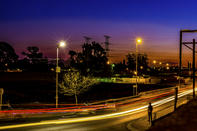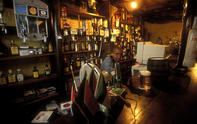City with No Lights
It was once appropriate to say that when night fell on Soweto is was like a prison gate, or like the hand of death because that was what night-times were like in a city with no lights.

But this is not so anymore; now that Soweto has been 'switched on' night comes more comfortably, as it does in any other city. As twilight on the Transvaal Highveld fades through crimson and indigo, so the street lights flare into life and the houses fill with the warming glow that comes with the flick of a switch.
Many people, however, still rely on coal, wood, gas and paraffin (kerosene) for their illumination, warmth and cooking, producing the smoke that gives Soweto its hazy morning shroud.
Shebeens

For Sowetans, shebeens are havens from the harsh outside realities and even the attendant dangers are not enough to keep away the people who come to socialize, meet friends and hopefully chat up a potential romantic interest. The word 'shebeen' is an Irish one, meaning an unlicensed drinking house.
There are about 4 000 shebeens in Soweto, most of which are well-run businesses that provide a vital social service in a place where there is little else to do at night. Not only do they offer booze at reasonable prices, there is music and dancing, pap and steak, vetkoeks and conversation to satisfy a hungry soul.
The hearty talk ranges over subjects from politics to Shakespeare; the stories of Hamlet and Macbeth are not lost on the people of Soweto. The low-class shebeens sell 'Barberton' and other cheap, kill-me-quick home-brewed concoctions. The more exclusive houses sell beer and spirits, fine wines and expensive cognac.
Because black people account for by far the largest share of alcohol consumed in South Africa, there is keen competition among the country's breweries and wine producers to do business with shebeen owners. Sponsorships are available to upgrade premises and many offer free promotions. Since most shebeens are run from private homes, the sponsorships are highly prized as they can be used to improve the owner's lifestyle.
As was the case with black taxi operators, in South Africa’s apartheid past, the Government never sanctioned the legal sale of alcohol to black folk. For years the police waged a determined battle against shebeens. They raided them, confiscated liquor and poured it down drains, and maybe even arrested the shebeener and his or her clients. Business is business and so the shebeeners found ingenious ways to outsmart the cops, but many sustained heavy losses all the same.
The main reason for this war was the fact that administration boards derived most of their income from liquor sales at board-owned beer halls. The authorities did not appreciate competition from the shebeens. A private home, however, is far more comfortable and civilized than the rows of concrete benches and tables of the beer halls. Anyway, the beer halls were frequented mainly by rough, hard-drinking migrant workers; no place for a guy to take his girl on a date.
Licensed Taverns
In earlier years there were about 200 licensed taverns (in recent years probably more) in Soweto that are quite different to the old-style shebeens, those that had to operate in secret for fear of police raids.
Journalist Vusi Khumalo writes in the glossy black magazine Tribute: 'To the cynics — or better still, to the white community — shebeens are seen as dens of iniquity where people engage in free-for-alls and explore the dismal swamps of alcohol.' This is not so, says the owner of the famous Pelican Club and chairman of the National Taverners Association (NTA), Lucky Michaels.
He reckons that in their own way, the shebeens represent the people’s dogged defiance and so have survived against officialdom and general disapproval. After a long campaign waged by the NTA, the first shebeens were granted licences in 1984. They call themselves taverns now and tend to be upmarket, more exclusive places where patrons can park their flashy cars outside without fear of a raid. Even these taverns are still housed mostly in private homes.
From the outside, the only thing that distinguishes them from their neighbours are the renovations that have been paid for with the profits, and sometimes there are boards outside which invited passersby to ‘Down a Lion’, or advertise ‘Ohlssons, the beer for the new generation’.